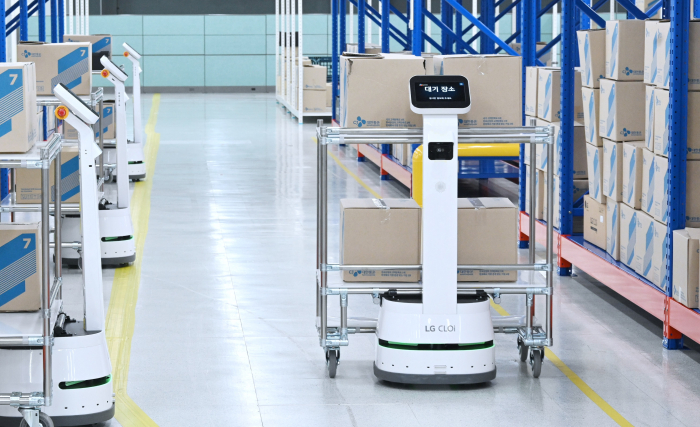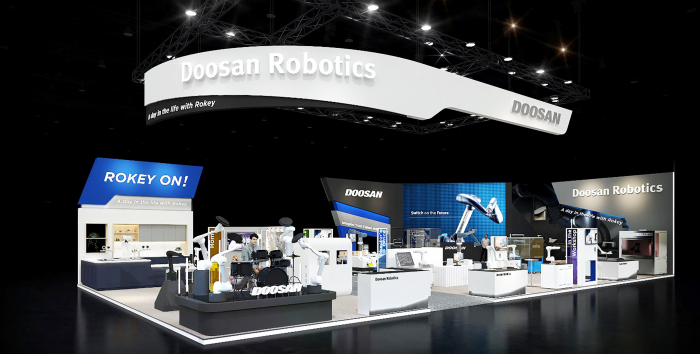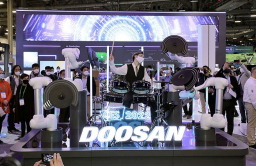-
KOSPI 2812.05 +41.21 +1.49%
-
KOSDAQ 756.23 +6.02 +0.80%
-
KOSPI200 376.54 +6.64 +1.80%
-
USD/KRW 1373 3.00 -0.22%
LG stands out among conglomerates in race to strengthen robotics arms
Robotics
LG stands out among conglomerates in race to strengthen robotics arms
KT, Hyundai, and Doosan also invest heavily to beef up their robotics businesses amid surging demand in the services sector
By
Jul 15, 2022 (Gmt+09:00)
2
Min read
News+

South Korean conglomerates are rushing to nurture their robotics businesses, encouraged by surging demand for robots in the service industry.
LG Electronics Inc. is widely considered the industry leader for having provided customized solutions to hospitals, hotels, and restaurants before its competitors.
The electronics arms of LG Corp. made a string of investments in robotics startups, starting with wearable robot maker SG Robotics in 2017. SG Robotics’ technology is designed to assist people with mobility challenges, such as paraplegics and neuromuscular disease patients.
After a number of deals with Korean startups, LG also invested in San Francisco-based Bossa Nova Robotics as its first overseas investment in a robotics partner in 2018.
In the same year, LG acquired South Korean robotics startup Robostar Co., which manufactures and distributes industrial robots and information technology component equipment.
The company released the seventh LG CLOi GuideBot model this year, which it markets as the first multi-purpose customer service robot.
Wireless carrier KT Corp. has joined forces with Hyundai Robotics Co., a subsidiary of Hyundai Heavy Industries Group.
In 2019, the company deployed N bots for service at its Novotel Ambassador Seoul Dongdaemun to distribute amenities to each room.
The N bot is expanding its use cases to barista and care robots.
The challenge now is to get the products used at beyond its affiliates' premises, with the recently launched artificial intelligence-powered sanitizing robot.
During the height of the COVID-19 pandemic, humans had to wear protective clothing to spray disinfect fluid in an empty space.
KT’s N bots, however, can be in the same space as humans as they use eco-friendly plasma to sanitize and purify the air.
The business model is not restricted to the sale of robots but also encompasses their installation at work, the use of relevant platforms, remote control options, and after-sales services.
The robots have been sold and installed at restaurants and hotels since last July.
Doosan Group is continuing to cement its dominance in the robotics industry with Doosan Robotics, which has the biggest market share in South Korea’s collaborative robots or cobots market.
Cobots are intended for direct human-to-robot interaction within a shared space or where humans and robots are in close proximity. This is in sharp contrast to how industrial robots work, which is in isolation from humans for the latter’s safety.

Last month, Doosan Robotics participated in Automatica, Europe's biggest robotics solutions exhibition held in Munich, Germany, and showcased its cobots designed to be deployed at cafes and beerhouses.
“Cobots move alongside humans in a shared space, breaking down the stereotype of a robot being just equipment,” CEO of Doosan Robotics Ryu Jung-hoon said.
Write to Sin-Young Park, Seung-Woo Lee at nyusos@hankyung.com
Jee Abbey Lee edited this article.
More To Read
-
Jul 05, 2022 (Gmt+09:00)
-
 Artificial intelligenceLG CNS launches AI robot subscription service for warehouse operators
Artificial intelligenceLG CNS launches AI robot subscription service for warehouse operatorsJun 22, 2022 (Gmt+09:00)
-
Jan 17, 2022 (Gmt+09:00)




